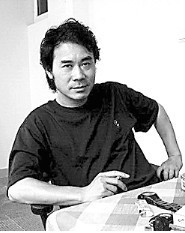Censorship: The First Prohibition, by Chen Xiwo
 In advance of his visit to Leeds on October 9th, here are Chen Xiwo's own words on his experiences of writing and censorship.
In advance of his visit to Leeds on October 9th, here are Chen Xiwo's own words on his experiences of writing and censorship.
(This article was originally published as the preface to Make-Do Publishing's Modern Chinese Masters volume of his work, and is reprinted with their kind permission).
At about the same time that I learned an English edition was planned, a decision was reached in my case relating to The Book of Sins. From the start I had never believed that this work could pass the China censors, and sure enough the whole case that I had brought against China’s literary authorities was dropped. The reason given was that this was the sixtieth anniversary of the founding of New China.
My pessimism was a result of what had gone before. In 2007 an unabridged version of The Book of Sins was published in Taiwan, but copies sent to me in mainland China were seized, the most important reason for this being that the book contained the banned novella I Love My Mum.
In 2004 on its first publication in a southern literary magazine, this novella had been severely criticized. Beijing got involved and the Propaganda Ministry ordered its local office to take action. The executive editor of the magazine narrowly escaped the sack and had to submit to three weeks of criticism.
To be prohibited is normal for me. Basically, everything I have published has either been banned or else extensively revised. China still has legions of censors willing to act as loyal guard dogs. Their paid work offers them two types of satisfaction: one is money, and the other is the notion that they have convictions. They get paid and they can have convictions: what could be better than that!
Of course, most of these censors are hacks who don’t really believe in what they are safeguarding. Just like everyone else, they love to read banned books, and secretly they curse the government even more than other people. As soon as they put on their censor’s cap though, they are again the embodiment of the government, operating with the authority of the state.
Nowhere is it explicitly stated what is forbidden; the whole system depends on ‘self-censorship’. The editor of one literary journal once told me that he himself didn’t know what he could or couldn’t publish. As a result, most people operate within ever tighter restraints. They say it is “the people” restraining you, but “the people” never asked the government to stop them reading what they wanted.
In 2005, my novel Irritation was banned as soon as it appeared. Simultaneously, the same publishing house’s Serve the People by Yan Lianke was also banned. Irritation was banned because of sexual content, and Serve the People because of politics. The publishing house and its editors came under great pressure. At the time there were those who said that because Serve the People’s problem was politics, there was still hope in that case, because political lines are always subject to reversal, but Irritation’s problem was sex and so it could never be redeemed.
All through the ages, sex has been the first prohibition. But why does sex need this rigorous supervision? In any society, ordinary people, if they are intent on sex, won’t pay any attention to government, while rulers are even more likely to do as they please. But sex is political. Any regime will always put the Marquis de Sade in jail.
Of course, I am writing about public sex. Sex, if you can only keep it in the shadows, can still flourish. In today’s China, many places rely on sex to drive their economic growth. These are known as ‘prostitute economies’. Those raised in a culture of shame don’t believe in the omnipresence of God, only in the scrutiny of others. Twenty years ago, if people wanted to join the Communist Party, others would shun them; today things have changed.
In this world I don’t look for moral virtue, because there is none and there never has been. What moral codes mainly prove is that past generations have never lived up to them.
Of course the existence of these codes represents a challenge to evil. Even if people behave in a despicable way, there can be moments of illumination; even if they don’t change their behaviour, they may realize what they are doing. If this is all, it is already no small thing; the beginnings of human awareness. In I Love My Mum the central character has just this kind of awakening. In this respect he is not only no degenerate, he is even a model for morality in our generation. When he realizes that the object of his desire is his own mother, he shouts it out, wakes his mother up, lifts the covers, acknowledges his crime.
This is my style of writing, although lots of people don’t understand why I want to write this way. It embarrasses them. It makes people unhappy, makes them anxious. People look at me like I am an evil spirit. Well I prefer to be this kind of evil spirit, rather than an angel who sings all day long in praise of some “golden age of China.”
A country which has reached middle-income country level apparently still needs to sacrifice people to economics. Well a country without people at its core is worthless; a writer with no dignity, writing what he is told, accepting of being banned and censored, is a coward, and this writer will only write rubbish.
I am not willing to write rubbish, and I am not willing to be a coward.
